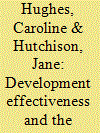| Srl | Item |
| 1 |
ID:
110104


|
|
|
|
|
| Publication |
2012.
|
| Summary/Abstract |
International aid agencies have experienced a 'political turn' over the past decade, with political economy analyses becoming increasingly numerous as a means to drive development effectiveness. Yet aid agencies have so far failed to shift their aid modalities in response. The problem lies in an inadequate conceptualisation of 'politics'. Most donors continue to see development as a public good, rather than as the focus of contestation in a context of societal struggle, and consequently fail to take oppositional forces sufficiently seriously. This facilitates the misapplication of terms such as 'partnership' and 'ownership', contributing to failures in efforts to promote reform. A more truly political analysis of aid intervention entails two innovations: the use of structural analysis to distinguish between interests in reform; and the use of this distinction, in turn, to inform the practice of taking sides in political struggles. Case studies of international aid programmes in Cambodia and the Philippines illustrate how the failure of donors to take sides with particular reformers has resulted in lost opportunities to achieve concrete outcomes from development projects.
|
|
|
|
|
|
|
|
|
|
|
|
|
|
|
|
| 2 |
ID:
071713


|
|
|
|
|
| Publication |
2005.
|
| Summary/Abstract |
International organizations will have an important role to play in an accelerated program of development assistance in North Korea once the constraints on such a program are removed through a political settlement of the nuclear issue. The critical roles of the multilateral agencies will be coordinating the aid effort, supporting development planning, building development capacity, investing in infrastructure, and streamlining private investment. NGOs, building on experience already gained in North Korea, will also make crucial contributions, such as by focusing on community-level engagement, vertical and horizontal linkages, and innovation and risk-taking. These roles will be essential for coaxing North Korea along the path of economic reform and opening, gaining the trust of the North Korean people, and keeping the donor publics engaged.
|
|
|
|
|
|
|
|
|
|
|
|
|
|
|
|